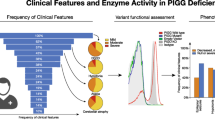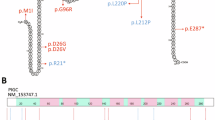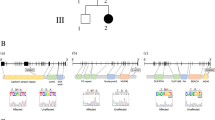Abstract
Three different genes of the glycosylphosphatidylinositol anchor synthesis pathway, PIGV, PIGO, and PGAP2, have recently been implicated in hyperphosphatasia-mental retardation syndrome (HPMRS), also known as Mabry syndrome, a rare autosomal recessive form of intellectual disability. The aim of this study was to delineate the PIGV mutation spectrum as well as the associated phenotypic spectrum in a cohort of 16 individuals diagnosed with HPMRS on the basis of intellectual disability and elevated serum alkaline phosphate as minimal diagnostic criteria. All PIGV exons and intronic boundaries were sequenced in 16 individuals. Biallelic PIGV mutations were identified in 8 of 16 unrelated families with HPMRS. The most frequent mutation detected in about 80% of affected families including the cases reported here is the c.1022C>A PIGV mutation, which was found in both the homozygous as well as the heterozygous state. Four further mutations found in this study (c. 176T>G, c.53G>A, c.905T>C, and c.1405C>T) are novel. Our findings in the largest reported cohort to date significantly extend the range of reported manifestations associated with PIGV mutations and demonstrate that the severe end of the clinical spectrum presents as a multiple congenital malformation syndrome with a high frequency of Hirschsprung disease, vesicoureteral, and renal anomalies as well as anorectal malformations. PIGV mutations are the major cause of HPMRS, which displays a broad clinical variability regarding associated malformations and growth patterns. Severe developmental delays, particular facial anomalies, brachytelephalangy, and hyperphosphatasia are consistently found in PIGV-positive individuals.
Similar content being viewed by others
Log in or create a free account to read this content
Gain free access to this article, as well as selected content from this journal and more on nature.com
or
References
Hansen L, Tawamie H, Murakami Y et al: Hypomorphic mutations in PGAP2, encoding a GPI-anchor-remodeling protein, cause autosomal-recessive intellectual disability. Am J Hum Genet 2013; 92: 575–583.
Krawitz PM, Murakami Y, Riess A et al: PGAP2 mutations, affecting the GPI-anchor-synthesis pathway, cause hyperphosphatasia with mental retardation syndrome. Am J Hum Genet 2013; 92: 584–589.
Krawitz PM, Schweiger MR, Rödelsperger C et al: Identity-by-descent filtering of exome sequence data identifies PIGV mutations in hyperphosphatasia mental retardation syndrome. Nat Genet 2010; 42: 827–829.
Krawitz PM, Murakami Y, Hecht J et al: Mutations in PIGO, a member of the GPI-anchor-synthesis pathway, cause hyperphosphatasia with mental retardation. Am J Hum Genet 2012; 91: 146–151.
Thompson MD, Roscioli T, Marcelis C et al: Phenotypic variability in hyperphosphatasia with seizures and neurologic deficit (Mabry syndrome). Am J Med Genet A 2012; 158A: 553–558.
Horn D, Krawitz P, Mannhardt A, Korenke GC, Meinecke P : Hyperphosphatasia-mental retardation syndrome due to PIGV mutations: expanded clinical spectrum. Am J Med Genet 2011; 155A: 1917–1922.
Nozaki M, Ohishi K, Yamada N, Kinoshita T, Nagy A, Takeda J : Developmental abnormalities of glycosylphosphatidylinositol-anchor-deficient embryos revealed by Cre/loxP system. Lab Ivest 1999; 79: 293–299.
Acknowledgements
We thank the patients and their families for participating. We acknowledge P Meinecke for critical review of the manuscript. This work was by supported by grants from the Ministry of Science, Education and Sport, Republic of Croatia, grant No: 108-1081870-1885 to IB, LP, MĆ, and DPR.
Author information
Authors and Affiliations
Corresponding author
Ethics declarations
Competing interests
The authors declare no conflict of interest.
Rights and permissions
About this article
Cite this article
Horn, D., Wieczorek, D., Metcalfe, K. et al. Delineation of PIGV mutation spectrum and associated phenotypes in hyperphosphatasia with mental retardation syndrome. Eur J Hum Genet 22, 762–767 (2014). https://doi.org/10.1038/ejhg.2013.241
Received:
Revised:
Accepted:
Published:
Issue date:
DOI: https://doi.org/10.1038/ejhg.2013.241
Keywords
This article is cited by
-
PIGW-related glycosylphosphatidylinositol deficiency: A case report and literature review
Neurological Sciences (2024)
-
Mutations in the PIGW gene associated with hyperphosphatasia and mental retardation syndrome: a case report
BMC Pediatrics (2019)
-
Characterization of glycosylphosphatidylinositol biosynthesis defects by clinical features, flow cytometry, and automated image analysis
Genome Medicine (2018)
-
Analysis of exome data for 4293 trios suggests GPI-anchor biogenesis defects are a rare cause of developmental disorders
European Journal of Human Genetics (2017)



